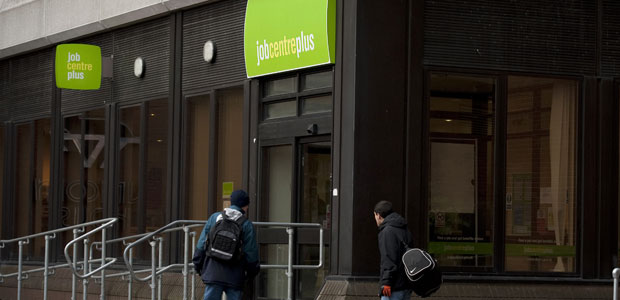The truth about falling unemployment
As unemployment falls for the fourth month in a row, Channel 4 News looks behind the figures and finds a mixed picture.

“Baffling” and “puzzling” – two of the adjectives used to describe the latest unemployment statistics.
Even though Britain is officially in recession, with future growth forecasts being revised downwards, unemployment dropped by 65,000 from March to May, while employment grew by 181,000.
The fall in unemployment is part of a trend that began in December 2011 and has continued since then. Good news, but it should not be forgotten that unemployment, at 2.58 million, is still at levels last seen 18 years ago.
Then there is the fact that the claimant count – those receiving jobseeker’s allowance – rose in June by 6,100 to 1.6 million.
The Work Foundation think tank said that with output falling, the drop in unemployment was “welcome but baffling”.
The British Chambers of Commerce described the situation as “puzzling” and said it was “difficult to believe that the economy has been in recession since the final quarter of 2011”, while the Chartered Institute of Personnel and Development said “the labour market continues to defy the laws of economic gravity”.
One troubling feature of the recession is the rise in the numbers of long-term unemployed. This figure increased again in March to May by 18,000 and now stands at 441,000, the highest since 1997.
Another concern is unemployment among 16 to 24-year-olds, which fell by 10,000 to 1.02 million.
Why has the claimant count risen?
First, it has to be pointed out that the unemployment figures cover March to May, while the latest claimant count statistics relate to June. The figures do not cover the same periods.
The Office for National Statistics said the rise in the claimant count could have been influenced by policy changes.
Since May, lone parents claiming income support who are able to work have been moved on to jobseeker’s allowance when their child is five. Previously this happened when their child was seven.
There has also been a reassessment of incapacity benefit claimants. Since April 2011, 1.5 million claimants have been reassessed to see whether they are fit to work, with those judged to be so switching from incapacity benefit to jobseeker’s allowance.
There is another issue, according to Work Foundation researcher Andrew Sissons. He told Channel 4 News that while he believed policy changes “have had some effect” on the claimant count, that was not the whole story.
“The claimant count does not necessarily follow the headline rate of unemployment,” he said. “You often see when people get out of work that they are not always keen to claim jobseeker’s allowance straight away.
“Unemployment is a million higher than the claimant count. It’s clear a lot of people aren’t making these claims.”
Long-term unemployment
Mr Sissons said the rise in long-term unemployment was to be expected. “This is what happens in a deep recession. Some people get pushed out of their jobs early and struggle to get back in.
“You see people slipping down the queue to get a job. These people who have been out of work for a long time find it more difficult to get back into work.”

“Some of these people will have lost jobs in the first wave of the recession, some in the public sector, some in manufacturing and construction. You’re particularly vulnerable if you live in places where job prospects are bleak.”
Youth unemployment
Although there was a small drop in the unemployment rate for 16 to 24-year-olds in June, one in five people in this age group is out of work.
Andrew Sissons said: “Things are still incredibly tough for young people. It’s the biggest problem in the labour market.
“It’s consistent with what has happened in previous recessions. In recessions, young people get hit hardest. It seems experience is the primary factor. When companies are knuckling down and need workers they can depend on, that is when experience comes to the fore.
“Young people don’t have experience, and it’s very hard to get experience without getting a first step in the labour market.”
Mr Sissons said the latest figures showed that older people were benefiting from job creation, rather than the young.
“By way of context, we’ve seen 52,000 new jobs for people over 65 in the last three months, against 13,000 new jobs for people who are 16-24. For people over 50, there were 93,000 new jobs.
“Job creation is much faster for people in older age groups. That has been a feature of the last four years.”
-
Latest news
-
As India goes to the polls in the world’s largest election – what do British-Indians think?6m

-
Tees Valley: Meet the candidates in one of the biggest contests coming up in May’s local elections4m

-
Keir Starmer says public sector reform will be a struggle7m

-
Nicola Sturgeon’s husband Peter Murrell charged with embezzlement of funds from SNP1m

-
Ukraine might finally get $60billion in American weapons and assistance to defend against Russia3m

-





